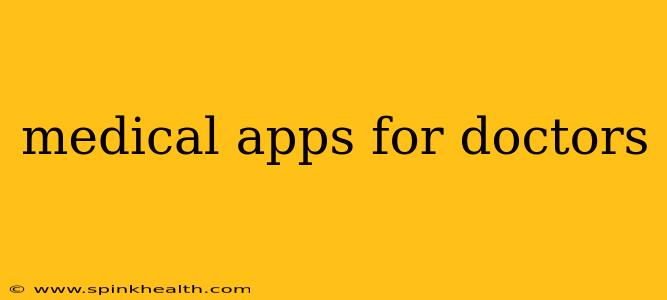The world of medicine is rapidly evolving, and technology plays an increasingly crucial role in how healthcare professionals deliver care. Gone are the days of solely relying on paper charts and bulky desktop computers. Today, doctors are embracing a wide array of medical apps designed to streamline their workflow, improve patient communication, and enhance the overall quality of care. But with so many options available, finding the right tools can feel overwhelming. This guide explores the diverse landscape of medical apps for doctors, addressing common questions and highlighting key features to consider.
What are the best medical apps for doctors?
There's no single "best" medical app, as the ideal choice depends heavily on a doctor's specialty, practice size, and individual needs. However, many apps consistently receive high praise for their functionality and user-friendliness. These often include features like secure messaging, appointment scheduling, telehealth capabilities, and electronic health record (EHR) integration. The key is to find an app that seamlessly integrates with your existing workflow and enhances your efficiency.
What medical apps do doctors use for patient communication?
Effective communication is the cornerstone of excellent patient care. Many apps facilitate seamless interaction between doctors and patients. Secure messaging platforms allow for quick and private exchanges, eliminating the delays and potential miscommunications associated with traditional methods. Some apps even integrate with patient portals, allowing patients to access their medical records, request appointments, and send messages directly through the platform. The ability to quickly respond to patient queries, provide updates, and schedule follow-ups is a significant advantage these apps offer.
What are some examples of medical apps that help with scheduling?
Time management is a critical concern for busy healthcare professionals. Several apps specifically address appointment scheduling, automating many tasks and reducing administrative burden. These apps typically offer features such as online booking, calendar synchronization, automated reminders, and waitlist management. This allows doctors to dedicate more time to patient care and less time on scheduling logistics. The integration with EHR systems is also crucial for accurate record-keeping and seamless scheduling processes.
How can medical apps improve patient care?
Medical apps have the potential to significantly improve patient care in several ways. Improved communication leads to better understanding and adherence to treatment plans. Faster access to medical information allows for more timely interventions and better decision-making. The ability to remotely monitor patients through telehealth features improves patient outcomes and reduces unnecessary hospital visits. Ultimately, the use of the right medical apps empowers doctors to provide more efficient, personalized, and effective care.
Are medical apps secure and HIPAA compliant?
Security and compliance with HIPAA (Health Insurance Portability and Accountability Act) are paramount considerations when selecting a medical app. Reputable app developers prioritize data security through robust encryption, access controls, and regular security audits. Ensure that any app you consider specifically states its HIPAA compliance to protect patient data and avoid legal issues. Look for independent verification of security protocols.
What are the challenges of using medical apps?
While the benefits of medical apps are substantial, challenges remain. The initial investment in learning new technology and integrating it into existing workflows can be time-consuming. The need for reliable internet access in certain areas may pose difficulties for some practitioners. Maintaining data security and ensuring compliance with ever-evolving regulations requires vigilance. Finally, the sheer number of available apps can be daunting, requiring careful research and selection.
Conclusion: Embracing the Future of Healthcare
Medical apps are transforming the landscape of healthcare, empowering doctors to provide more efficient, accessible, and patient-centric care. By thoughtfully selecting and effectively utilizing these tools, doctors can streamline their practice, enhance communication, and ultimately improve the health and well-being of their patients. Choosing the right apps requires careful consideration of individual needs and a commitment to staying informed about the latest technological advancements in the field. The future of healthcare is digital, and these apps are leading the way.

